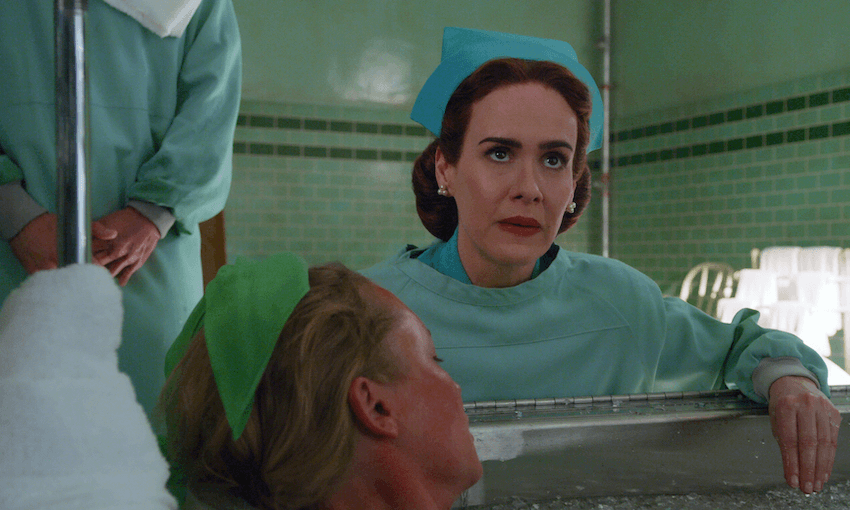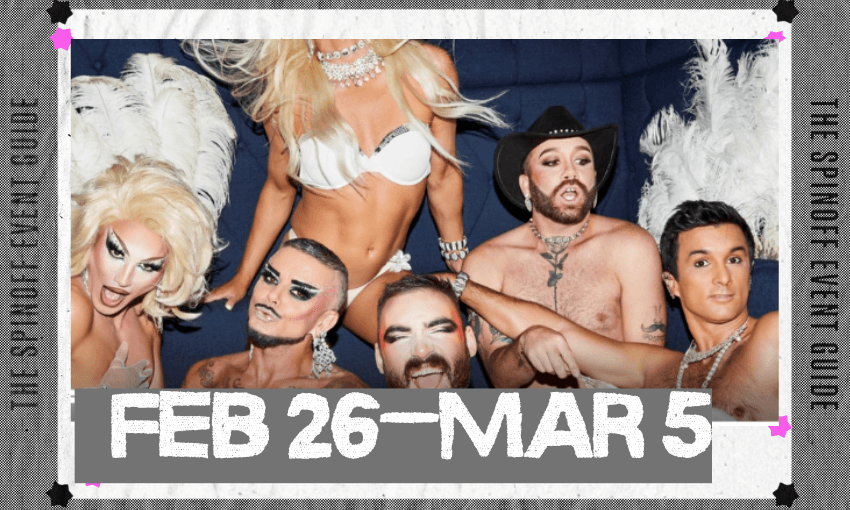Netflix drama Ratched aims to rehabilitate the villain from One Flew Over the Cuckoo’s Nest, but would do better in the electric chair.
Nurse Ratched is, quite rightly, one of the most famous movie villains of all time. The source of all of McMurphy’s despair and angst in One Flew Over the Cuckoo’s Nest, written by Ken Kesey in the 50s but more famously adapted by Milos Forman in the 70s, she’s a one-woman representation of everything that’s wrong with the system, man. She’s also, by the author’s own admission, a hugely sexist creation.
In the novel, Ratched is the very embodiment of everything that Kesey thinks is wrong with society: she’s rigid, she’s unfair, and she’s… a she. Louise Fletcher, in her famous turn in the film, did everything she could to strip out the sexism inherent in the script by playing Ratched as professional rather than cruel, but the core remains. It’s a fool’s errand to try to rehabilitate that character into something human and three-dimensional. But, for some reason, that’s what Netflix drama Ratched tries to do.
Ratched tries to Maleficent its way out of the cage that Kesey wrote for the nurse: it gives her a backstory. It’s a generally accepted principle that if we understand why bad people do the things they do we’ll empathise with them, or at the very least sympathise with them. In aid of that, the show aims to give us all the dimensions of Ratched before we saw her in One Flew Over the Cuckoo’s Nest, and throws us back to post-war America, to the character finding work at her first mental hospital, for reasons that become immediately, thuddingly, apparent.
Or at least that’s what I’m sure the creators, gilded charlatan Ryan Murphy and newcomer Evan Romansky, think their show is doing. The final product (already renewed for a second season, bewilderingly) is more like fanfiction written by someone who skimmed a high school essay on One Flew Over The Cuckoo’s Nest. It reimagines Ratched not as the embodiment of a corrupt system, but as a woman with a dark past who will do absolutely anything, up to and including murder, to get what she wants. The writers throw every cliche in the bag at the character – struggles with sexuality, a murderer’s row of fetishes, an eye-rolling omniscience – to lead us to an understanding of the character we saw behind the glass screen in that film nearly 50 years ago. Not only do we not understand that character, we barely understand the one onscreen.
Once you take away the fanfiction trappings and all the bizarre homages/ripoffs of classic films (Cape Fear, Silence of the Lambs Written on the Wind), Ratched is business as usual for Murphy. It’s a colourful, expensive-looking show that puts overqualified actors in the same room together, hands them scripts that are more fit for a shredder than a performer, and expects the great reviews to roll in. Murphy had a resurgence with the success of American Horror Story, which turned to schlock after a few seasons, and then another with American Crime Story, which, in fairness, seems to be legitimately great. But Ratched, the second show of his lucrative Netflix deal, is his worst output yet. And yes, that includes The Politician.
Ryan Murphy’s work is easy to watch because you can turn your brain off. The acting is loud, the sets are gorgeous, and every time you get bored, there’s another ludicrous plot twist to lure you in. It’s a gamble that’s clearly worked for him, but it fails the television auteur badly here. His most obvious folly is his reliance on those great, loud actors. Murphy regular Sarah Paulson plays Ratched and is on paper a great choice for the role: she’s incredibly versatile, able to play off her soft affect to great results, most memorably in 12 Years a Slave. But the Ratched the show has corralled her into playing makes no sense. She’s stuck having to do a Louise Fletcher impression (surely the only time that’s ever been called for) when the show is actually asking her to play an all-knowing, manipulative femme fatale with, ironically for the character, a penchant for tearing down the system around her. It’s an impossible task and while she’s fun to watch in the moment, she never manages to actually make sense of anything.
The rest of the cast, who don’t have the burden of carrying the show on their discreetly placed shoulderpads, generally fare better. Judy Davis, who has been a one-woman abattoir for most of her career, is surprisingly subdued here as Nurse Bucket, Ratched’s superior at the hospital. Cynthia Nixon taps into the same level of pathos she brought to Emily Dickinson in A Quiet Passion, and single-handedly crafts the only emotional arc the show has onto its terminable eight episodes. Everybody else is a right old mixed bag though, from Finn Wittrock’s dead-eyed serial killer through to Sophie Okonedo’s take on a patient with dissociative identity disorder that would’ve been considered offensive when the source text was first written. Murphy owes them all apologies for what he’s given them, but I guess a pay cheque will have to suffice.
Ratched can’t get past the idea at its core: it’s a man’s misogynist fantasy. The problem is that Murphy and Romansky’s reimagination is no less misogynistic – it just comes from a different angle. Rather than being a thin metaphor for societal oppression, this Ratched is a collection of tired tropes and hacky cliches that add up to something even more hollow: yet another villain with backstory that tries to wave away every ludicrous thing we see. The problem isn’t necessarily that Murphy and Romansky don’t understand Nurse Ratched, there’s not a lot to get. The problem is they don’t even seem to understand the character they’re putting in front of us, and worse, don’t seem to care. Beautiful gowns, though.
You can watch Ratched on Netflix now.



